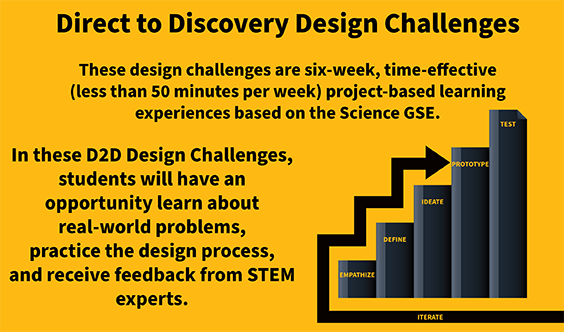D2D Design Challenges

Engage your students in authentic STEM design with our expert-created design challenges.
About this D2D series
The Direct to Discovery Design Challenge series leverages the STEM expertise of GTRI and GT researchers to bring real-world scenarios to the classroom through the design process! Through a combination of live remote experiences and asynchronous resources, students get the opportunity to deepen their STEM knowledge, and receive feedback on their ideas and designs from engineers and scientists. These D2D Design Challenges are built in coordination with participating researchers and utilize a project-based learning format over a multiple-week period to allow students to explore, engage, and experience authentic STEM design.
Upcoming D2D Design Challenges
 | How can we explore dangerous terrain safely? This design challenge engages students in using the engineering design process to virtually design a robot capable of exploring the harshest terrain on Earth and other bodies in our solar system. This design challenge is aligned to the 6th grade science GSE and leverages grade-appropriate GSE in computer science and language arts. |
 | How can we explore ecosystems without disturbing them? This design challenge engages students in exploring organisms with highly unique adaptations and challenges them to design devices capable of observing them interacting with their environments without disturbing them. This design challenge is aligned to the 7th grade science GSE and leverages grade-appropriate GSE in computer science and language arts. |
 | How can we design solar systems for our community? This design challenge engages students in using resources from the National Renewable Energy Laboratory to design and evaluate solar power systems for use in their community. This design challenge is aligned to the 8th grade/HS physical science science GSE and leverages grade-appropriate GSE in computer science and language arts. |
 | How can we treat wastewater without consuming chemicals? This design challenge engages students in evaluating ways to treat wastewater without minimal waste. This green chemistry design challenge is driven by UN Sustainable Development Goal 6: Clean Water and Sanitation. This design challenge is aligned to the chemistry GSE and leverages grade-appropriate GSE in language arts. |
Frequently Asked Questions
How do these design challenges work?
Over the period of time described for each design challenge, STEM@GTRI provides a portfolio of resources for teachers to use in-class that engage students in the design process to create solutions around the described problem. These design challenges are based off of GT/GTRI research - and the researchers involved will join us to help kick off each design challenge, provide valuable insight, and recognize the top designs.
Registering for the design challenges signs your classroom up for the resources and live interactions. Resources will become available 3 weeks prior to the start of the design challenge. Participating teachers are asked to attend a virtual prep session or view the recording prior to the design challenge kick off.
How much time is expected in-class?
The design challenges are created with instructional time in mind. Participating teachers should expect to budget about 30-45 minutes a week in-class to the design challenge resources, with students spending time outside of class working on their projects and collaborating.
Is this an individual design or a group design?
You know your students and classrooms best. We will review and select the top designs submitted by both groups and individuals and recognize them separately. You may also find this useful for students who want to do the project on their own. Some resources will not be applicable to classrooms that do 100% individual projects; however, these resources are not critical to the design challenge itself.
What are the live interactions?
The live interactions are 30 minute conversations with GTRI and GT researchers who have expertise in a field related to the design challenge. Much like the real world, these experts will have expertise related to the design challenge - but won't have all the answers or be giving out a recipe to make a successful design. Students will have to use these experiences, alongside the resources (and your support!) to create effective designs that meet the needs of each scenario. The live interactions will be held via BlueJeans Events, with links to the interactions accessible with registration.
Are there costs associated with these design challenges?
Each design challenge is designed with accessibility in mind and can be completed using free resources or those typically found in a classroom. This is particularly important during the 2020-2021 school year - and we have doubled down to ensure all the resources involved can be completed by a student in class or at home.
How will the projects be reviewed?
The projects will be reviewed by our expert panel using the rubric provided in the design challenge resources. Students will record their pitches or talks to our secure file sharing system by the communicated deadline. Our expert panel will review them and select the top designs, including the top group and top individual design. Recognition of the top design and our expert panel feedback will be shared via the conclusion event, as communicated in each design challenge's specific resources folder.




